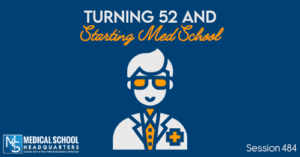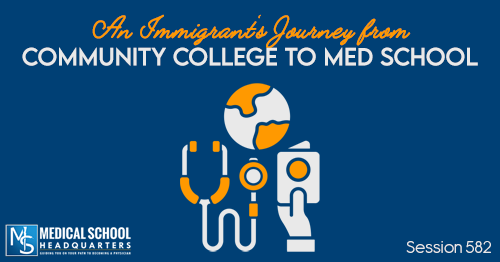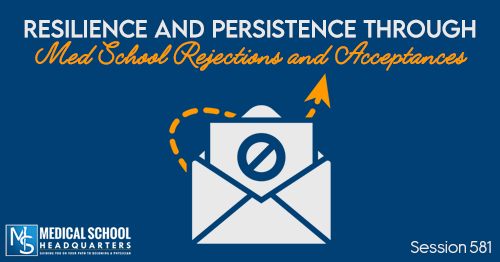Apple Podcasts | Google Podcasts
Session 484
What happens if you start undergrad as a premed, but realize you want to go explore the world, then you wake up some 20 years later and realize you want to go to med school now? Today, Carlos talks about his journey to medical school at the ripe age of 52! He talks about his journey all over the world, his journey to law school, what it was about his journey that kept him out of medical school, and ultimately, what brought him back.
For more podcast resources to help you with your medical school journey and beyond, check out Meded Media.
Listen to this podcast episode with the player above, or keep reading for the highlights and takeaway points.
[01:17] The MCAT Minute
The MCAT Minute is brought to you by Blueprint MCAT.
A lot of you are probably getting your MCAT scores back right now and then you realize you have to retake hoping to bounce back from a low score. The question is what did you do the first time and what do you need to do moving forward?
Don’t forget to create a free account over at Blueprint and get access to their study planning tool that you can customize according to your timeline. Also, get access to 1,600 plus amazing flashcards, half-length diagnostic, and full-length – all for free. Blueprint has you covered so check in with yourself and figure out what happened and how to move forward.
“One of the biggest mistakes students make is not doing enough practice questions and not taking enough full-length exams.”Click To Tweet[03:01] Interest in Becoming a Physician
Carlos had an interest in pursuing medical studies going back to college. He had taken the premed prerequisites, with his major being statistics. A lot of things were just basically electives. There was already a seed that was planted there.
From there, Carlos has been led in different directions. Although he wouldn’t think of them as diversions because in fact, in many ways, those have taken him to this place. That being said, he had no regrets about taking the extra time.
At 21 years old, his mentors encouraged him to explore the world. And so he did. When he graduated from college, he volunteered for a year abroad at a nonprofit organization, doing work in rural health care. And so, in his last 25 years, he had still been in the area of health care.
'What is the point of any goal? You only live life once. Goals are important, you want to work towards them. But at the same time, you want to be able to live and follow your heart.'Click To Tweet[09:56] The Power of Gratitude and Meditation
Carlos adds that he has been journaling since his early 20s. He would also spend at least once a month reflecting on how he was feeling and how things were going. He started keeping notes and divided them into three parts: short term, medium-term, and long term.
Practicing this gratitude and meditation practice for just five or ten minutes a day at the beginning of his day changes the tenor of what’s going to happen during the day.
[13:29] His Path to Law and Medicine
Because he has been doing work with the World Health Organization, he thought about pivoting in his early 30s. He had been working with a lot of refugees and asylum seekers, part of what the World Health Organization was doing.
In particular, he got interested in what led to their predicament, and these issues of policy. He ended up getting a JD in law school focusing on public health law. And so, his initial direction was to go to law school focusing on public health law and policy, which he did for three years.
He decided to get into medical school for his specific interests in community health, and also mental health care, particularly amongst certain populations. Also, he has done a lot of work in prisons and jails. He was assisting individuals who have been unjustly targeted by certain laws and have mental health challenges.
[18:07] His Community College Experience
Carlos was also aware of the fact that he had been out of school for a while. So he went back to school and took a number of courses at a couple of community colleges. And that just solidified his desire to become a doctor. He was just in awe of human physiology and his biochemistry went well.
Moreover, his age didn’t bother him in the slightest. In fact, he found himself enjoying being with a lot of the younger students.
A bulk of Carlos’ shadowing experience was back in his early 30s during his work with the World Health Organization. He had been working with a lot of physicians side by side with a lot of this prison and jail work. And so, in terms of knowing what the job entails and what is done, he already knows it.
[27:06] The Power of Intentionality
Carlos says he really never had any doubts as to whether he was not cut out for some classes. Rather much of his doubt was during the application process which he thought was just insane.
People told him to follow an approach where he just had to throw all these applications against the wall for all the schools. But then one of his mentors actually advised against it. Instead, he told Carlos to identify schools that would best fit his personality.
'Each school does have a different sense and sensibility... identify places that you think fit with you. Tell your stories and if there's a fit, it will be clear.'Click To TweetCarlos ended up applying to only nine schools. And the school he got into was his first choice. It was the right fit for him. They focus on a lot of community work and they have a lot of student-run clinics. It’s not a big school. And all that just fit him. Interestingly, as he was starting to write his essays and tell stories, he actually had that school in mind.
In other words, Carlos was very intentional with his application, contrary to what a lot of students do because they have this fear. They don’t do the self-reflection and introspection to figure out what they really want.
[34:22] Studying for the MCAT and Enjoying It!
Carlos says that studying for the whole MCAT was not exactly the most pleasant experience, to say the least, or even taking it. But when he decided to go through this process, he said to himself that he was going to enjoy it. And so, he got some books and did some self-study.
He found that the test itself is not so great, but the subject material is quite interesting. It brought out a lot of memories of a lot of things he had studied. He happened to love chemistry so it wasn’t a problem for him. And his physics and chemistry section which people seem to dislike went incredibly well beyond his wildest dream.
'I have to do this, but can we enjoy this? Trying to take that attitude helped in studying.'Click To TweetCarlos put together a study schedule over six months, doing four hours a day. He started doing the practice questions, which were more onerous. But the material itself was pretty interesting stuff and he liked it.
[35:59] Writing the Personal Statement
'What is it about these stories that bring out the values that I have and the things that drive me to get up in the morning and leave me to enjoy what I do?'Click To TweetCarlos thought to himself that if he was an admissions officer, and got a stack of 1000s of these things, he was sure he would much rather read some interesting stories and bullet-point lists. And so he put himself in the admissions committee’s shoes and took that kind of attitude.
Before submitting his application, Carlos did two or three weeks of just wordsmithing.
'Great art is never fun. It only stops in interesting places.'Click To TweetNow, this is a very common problem among students. You could nitpick to death and never submit. Students who get into that cycle of being not good enough. Then they turn around and realize it’s too late to submit.
Carlos also mentions being caught in a conundrum at one point as to what he should share and what not to share in terms of his experiences and being openly gay. But he realized he cannot go through life always second-guessing what to say and what not to say.
[43:03] Financial Considerations
Although Carlos is in a fortunate position where doesn’t have dependents or a large family to have to care for. But he recognizes that financial needs and issues are very real. At the same time, he had never met any human being who was truly happy or satisfied based on the amount of money they were making.
You want to make ends meet. But if you’re simply working for money, Carlos says he hasn’t really met anyone who’s happy in that area.
Carlos also feels lucky to have gotten a scholarship so it’s not going to be a big burden for him as well. Obviously, financial issues are real. But at the same time, if you’re doing something that you think you’re going to love and do love, it will sort itself out.
[45:51] The Interview Trail
Carlos got interviewed at five out of the nine schools he applied to because when he got admitted to his first choice, he pulled the applications. He wrote a very nice letter thanking them for the interview offer and that he made a decision so they can give a chance to someone else.
He ended up doing two sets. The first set was all the MMIs. Based on the recommendation, he viewed it as something that was fun because there are going to be little puzzles and challenges. The other interview he did was a mixture of MMI and long-form.
Ultimately, Carlos simply decided to approach the interview as if he were doing normal conversations with people.
Carlos is going to start medical school in July and so he has three months to get the ducks in a row before he starts what he considers to be his full-time job now.
[55:29] Final Words of Wisdom
'Follow your heart. If you follow your heart and feel that this is right for you, and you've done your due diligence, then go for it.'Click To TweetCarlos says there’s an element of being confident in where you’re feeling drawn. At the end of the day, listen to what your gut tells you and trust your gut.
Finally, I always talk about how it’s not too late. A lot of people don’t like that message, but it’s true. It’s not too late to go to medical school. If it’s something that you want to do, there’s a medical school out there that will gladly take you and train you and help you do what you want to do in your life.












